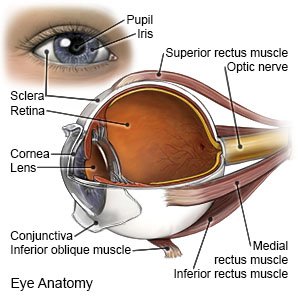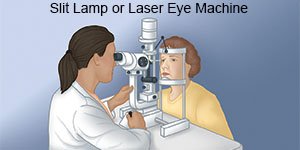Chemical Eye Burns
Medically reviewed by Drugs.com. Last updated on Sep 23, 2025.
What is a chemical eye burn?
A chemical eye burn is an injury to any part of your eye that is exposed to chemicals. A chemical eye burn is a serious injury and can result in permanent vision loss.
 |
Which chemicals can cause an eye burn?
- Chemicals in construction work, such as cement and plaster
- Cleaning agents such as drain cleaners or ammonia cleaners
- Sulfuric acid, such as fluid from a car battery
- Products that remove rust
- Hydrochloric acid
- Fireworks
- Pesticides and fertilizer
What are the signs and symptoms of a chemical eye burn?
- Pain, light sensitivity
- Blurry vision, loss of vision
- Red, swollen eyelid
- Cuts, bumps, or other damage on your eye
- Feeling like there is something in your eye
- Cloudy eye tissue
How is a chemical eye burn diagnosed?
Your healthcare provider will ask about your symptoms and when they started. He or she will ask what chemicals you were using at the time of your burn. Your provider will rinse your eye and test your vision and eye movements. You may need any of the following:
- A litmus paper test , or pH paper test, may show if the chemical has been rinsed off your eye. A small piece of paper is placed on our lower lid to catch your tears.
- A slit-lamp test may show injury to your eye or any chemicals left in your eye. Your provider looks at your eye through a microscope with a bright light.

- An eye stain test may show damage to your eye or any fluid leaking from your eye. Your provider will place dye and shine a blue light in your eye.
- Tonometry is a test that measures the pressure in your eye.
What should I do if I get chemicals in my eye?
- Rinse your eye immediately. Use a steady stream of water for at least 15 minutes . Use the cleanest water you can get to quickly. Never use other chemicals to rinse out your eye. Move your eyeball in all directions to make sure that all the parts are rinsed. If possible, continue to rinse out your eye with water until you reach the treatment center.
- Remove clothing that may still contain chemicals. Do not take out your contact lenses.
- If possible, safely bring the chemical container to show your healthcare provider. Do not bring the container if the chemical may burn you again.
How is a chemical eye burn treated?
- Eye care including continued rinsing may be needed. Your provider may need to remove any foreign objects from your eye. He or she may give you an eye patch to protect your eye while it heals.
- Medicines may be given to prevent infection, decrease pain and inflammation, or relax your eye muscles.
- Surgery may be needed if the damage to your eye is severe.
How can I prevent a chemical eye burn?
- Always wear eye protection , such as goggles, that fit closely around your eyes.
- Do not touch your eyes when you work with chemicals.
- Follow the instructions on the container when you use chemicals that may burn your eyes.
- Make a plan in case you or someone else gets burned. Know where the best water or liquid is located for rinsing your eyes. Check to see if your company has an eye wash station.
When should I seek immediate care?
- Your eyesight is blurry or you lose vision.
- You have cuts, bumps, or other damage on your eyeball.
- Your eye becomes red or cloudy.
When should I call my doctor?
- Your eye keeps watering or feels dry.
- Your pupil is larger than usual.
- You have questions or concerns about your condition or care.
Care Agreement
You have the right to help plan your care. Learn about your health condition and how it may be treated. Discuss treatment options with your healthcare providers to decide what care you want to receive. You always have the right to refuse treatment. The above information is an educational aid only. It is not intended as medical advice for individual conditions or treatments. Talk to your doctor, nurse or pharmacist before following any medical regimen to see if it is safe and effective for you.© Copyright Merative 2025 Information is for End User's use only and may not be sold, redistributed or otherwise used for commercial purposes.
Further information
Always consult your healthcare provider to ensure the information displayed on this page applies to your personal circumstances.
